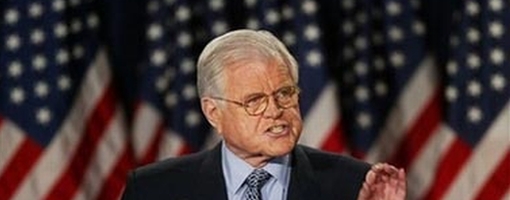
The UN High Commissioner for Refugees announced today that its annual Nansen Refugee Award will be awarded to the late Senator Edward Kennedy for his achievements as an unparalleled champion of refugee protection and assistance. For years Kennedy fought for the rights of the Saharawi people and refugees around the world. Press release, 15 Sept 2009.
Press release,
Norwegian Support Committee for Western Sahara
15 September 2009
"Ted Kennedy was a steadfast defender of the Saharawi people's right to determine its own future, in line with UN resolutions and international law. We are very pleased that the UN High Commissioner honors Kennedy's effort for refugees around the world", said Ronny Hansen in The Norwegian Support Committee for Western Sahara.
Time and again over several decades, Edward Kennedy championed the Western Sahara cause in the US Senate and the White House. He repeatedly criticized the US for not doing enough to pressure Morocco and strengthen the UN effort.
In 2000 he debated the issue directly with the Moroccan King, Mohammed VI. “The referendum is an important part of the peace process, and I hope that it will take place as soon as possible”, Kennedy said in a statement after the meeting.
In announcing the 2009 Nansen award, UN High Commissioner for Refugees António Guterres said: "Senator Kennedy stood out as a forceful advocate for those who suddenly found themselves with no voice and no rights. Year after year, conflict after conflict, he put the plight of refugees on the agenda and drove through policies that saved and shaped countless lives."
The Nansen Refugee Award is given annually to an individual or organization for outstanding work on behalf of refugees. Funded by Norway and Switzerland it was created in 1954 in honor of Fridtjof Nansen, the legendary Norwegian polar explorer and scientist, and the first High Commissioner for Refugees. In this role, he won the Nobel Peace Prize in 1922.
Kennedy made an enormous effort to put the Western Sahara issue on the political agenda. In 2008 he helped award the Saharawi human rights activist Aminatou Haidar the Robert F. Kennedy Human Rights Award.
"We have lost a loud and clear voice for the Saharawi people, but rejoice today in celebration of his life and service", said Hansen.
See UNHCR statement here: http://www.unhcr.org/4aaf5d4b6.html
Contact:
Ronny Hansen
President, The Norwegian Support Committee for Western Sahara
ronny@vest-sahara.no
Some of Kennedy's Western Sahara statements
"Due to serious violations of the peace plan by the Government of Morocco, the [MINURSO] observers have been prevented from fostering an atmosphere of confidence and stability conducive to holding a free and fair referendum"
Statement before the Senate Foreign Relations Africa Subcommittee, 1 Oct 1992.
"The ongoing crisis in the Western Sahara raises serious questions regarding the Government of Morocco's willingness to honor its international commitment to a free and fair referendum in the Western Sahara."
Statement, January 1994
"The International Court of Justice, the Organization of African Unity, the United States, and many nations throughout the world have not recognized Morocco's claim to the Western Sahara, but the Moroccan occupation continues."
Statement, June 1999
"Morocco gained the respect of the international community when it agreed in 1991 and again in 1997 to allow a referendum on the future of the Western Sahara. These actions demonstrated an impressive commitment to the right of self-determination for the people of the Western Sahara. The referendum is an important part of the peace process, and I hope that it will take place as soon as possible."
Press release after meeting between Kennedy and King Mohammed VI, 22 June 2002.
See also statement from 2000, in which Kennedy demands that US Secretary of State submits report to the Senate on progress of referendum.
"As US. citizens, we are fortunate to live in a country founded on human rights principles and the right to a government of our own choosing. Our democratic ideals have inspired peoples in all hemispheres around the world. Elections during the past twelve months in Russia, Burundi, Cambodia, Paraguay, and Yemen are examples of the world-wide trend away from authoritarianism and toward representative government.
Sadly, this trend has not yet reached all regions of the world. The indigenous Saharawi people in the Western Sahara have waited more than 18 years to regain their right to self-determination. Hopefully, that right will soon be restored to them.
Since Morocco's invasion of the Western Sahara in 1975, King Hassan II has staged a long and costly war against the Saharawi people to obtain permanent access to that territory's valuable natural resources."
Ted Kennedy in the US Senate, January 1994.
NY Check new Western Sahara poster!
“Try to Visit Western Sahara”…
The Security Council fails Western Sahara and international law
On 31 October 2025, a new resolution was adopted in the UN Security Council calling on the Saharawis to negotiate a solution that would entail their incorporation into the occupying power, Morocco.
Saharawis Demonstrate Against Trump Proposal
The United States has proposed in a meeting of the UN Security Council on Thursday that the occupied Western Sahara be incorporated into Morocco.
Skretting Turkey misled about sustainability
Dutch-Norwegian fish feed giant admits using conflict fishmeal from occupied Western Sahara. Last month, it removed a fake sustainability claim from its website.



